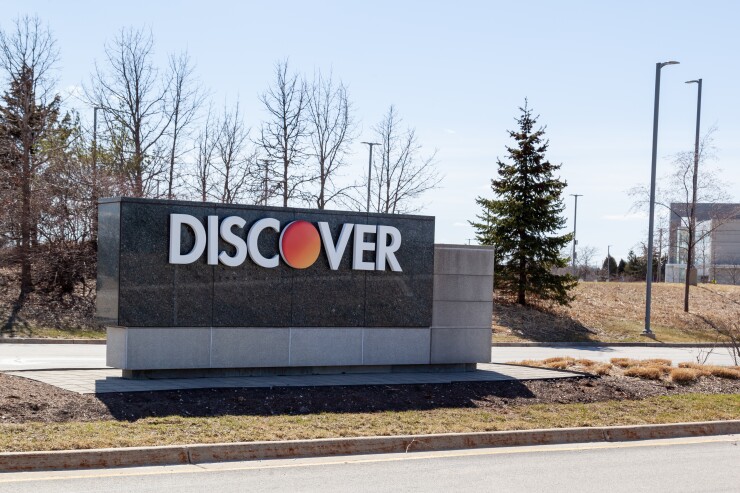
Discover Financial Services is exiting the student loan business after close to a decade of regulatory headaches stemming from improper loan servicing.
Regulatory flubs in student lending and elsewhere at the Illinois-based credit card giant preceded the
The company's student loan portfolio, which was the subject of consent orders in 2015 and 2020, is now being floated for a sale to another institution. Discover said Wednesday that its board of directors authorized executives to explore a sale of the $10 billion loan portfolio, as well as the transfer of servicing responsibilities to another party.
Discover also plans to stop accepting new student loan applications starting in February.
"During a recent review, the Board determined that exploring the sale and transfer of servicing of Discover's student loans is aligned with those priorities, better enabling Discover to focus on our core banking products, capitalize on our growth opportunities and deliver long-term shareholder value," John Owen, Discover's interim CEO and president, said in a news release.
The $143 billion-asset company is "committed to a path forward that enables a seamless transition for our customers as they advance their education and financial goals," Owen said.
The company's stock jumped more than 4% the day after the news.
The announcement makes "strategic sense," according to RBC Capital Markets analyst Jon Arfrstrom. When the sale occurs, Discover executives will be able to focus on the company's core credit card business and an associated payments network, as they also work through regulatory issues, Arfstrom wrote in a note to clients.
"We continue to believe that the resolution of these issues, the identification of a new permanent CEO, as well as the eventual reinstatement of a share buyback program are the key catalysts to the stock in the near term," Arfstrom wrote.
Discover has put share buybacks on pause since it disclosed in July that it
Private student lending has been a "solid performer for Discover," but it was ultimately not a material part of the business and required substantial compliance spending, Arfstrom wrote. Private student loans, which represent a small portion of the total U.S. market, are backed by private-sector lenders, rather than the federal government.
In 2020, the Consumer Financial Protection Bureau forced Discover to pay $35 million after a flopped migration to a new student loan servicing platform. The company had withdrawn payments for thousands of borrowers without proper validation and had canceled payments for other customers without notifying them.
Discover had also misstated the minimum payments owed to more than 100,000 consumers — in violation of a 2015 consent order that covered similar issues — according to the CFPB.
Last year, Discover's board
John Hecht, an analyst at Jefferies, wrote Wednesday in a note to clients that the expected sale "will likely simplify the business and refocus on the core business" and will ultimately bolster Discover's "regulatory infrastructure."
Hecht is among the analysts who are optimistic that the regulatory clouds will soon clear for Discover.
The sale of Discover's student loan business may result in a modest gain, Hecht wrote. He pointed to a 6% gain for Sallie Mae after it sold a $1 billion student loan portfolio.
As for potential buyers, private equity firms could swoop in, but Navient and SoFi Technologies may also be interested, Hecht wrote.
Discover said it has no deadline or definitive timetable to finalize a sale. It has hired Wells Fargo Securities as its financial advisor and the law firm Skadden, Arps, Slate, Meagher & Flom for legal advice.






